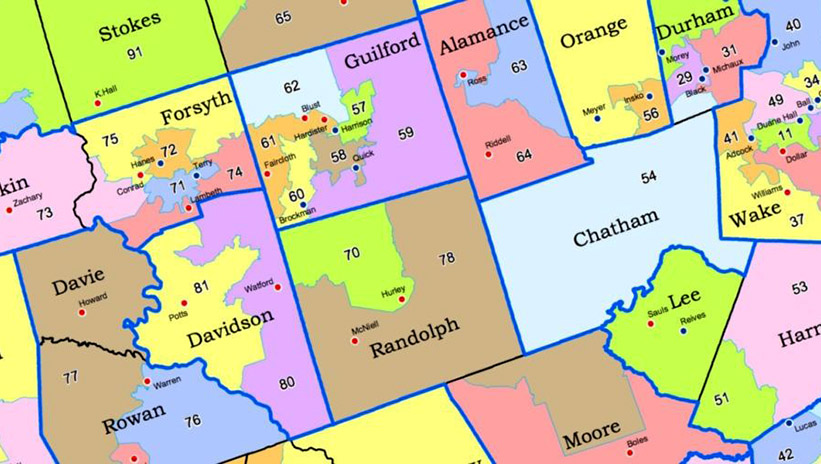Publisher's note: This post appears here courtesy of the Carolina Journal, and written by Brooke Conrad.

Defendants in
Common Cause v. Lewis spurned plaintiffs' objections to their new 2020 House election maps, claiming the objections
"appear to be the product of the partisan goals of the North Carolina Democratic Party."
Plaintiffs
last week accused House Republicans of partisan bias in five separate county groupings, arguing for a referee to redraw them. But in their
43-page brief filed Friday, Oct. 4, defendants argued partisanship was never a factor in their proceedings. The court should either throw out both the House and Senate maps, or at least redraw the offending lines to match a random computer simulation created by plaintiff expert professor Jowei Chen, defendants say.
Consultation with data analysts
Among the plaintiffs' most scalding allegations was that Republicans consulted with political data analysts to tilt the maps in their favor. But that's not true, defendants say. The only reason they needed to discuss the maps with their consultants was to verify their authenticity. Republicans' own counsel, defendants claim,
"lack the skill to vet the data."
"Needless to say, the Committees were justified in not relying, without independent vetting, on the representations of an adverse lawyer and expert," they wrote.
Republicans even publicly notified the committee they were using their consultants, defendants wrote. Plaintiffs' lawyers - who were present at the time - didn't object to or question the vetting.
The suspicious email
Defendants also explained what plaintiffs framed as a suspicious email, sent to all members of both redistricting committees Sept. 9, the first day of the map-drawing process. The email contained all of the partisan data Chen aggregated for the trial. Members weren't supposed to consult the data while drawing the maps. Defendants say they sent the data because they understood plaintiffs would do the same thing, and that legislative staff needed to compare both counsels' data sets to make sure they were accurate.
Only two House members' offices actually downloaded the data after the email was sent, defendants say. One was Rep. Pricey Harrison, D-Guilford, but they defend her, saying
"there is no evidence of a successful attempt on her or her office to inject partisan changes into the maps."
The other download was by the legislative assistant for Rep. John Torbett, R-Gaston, who was following her
"ordinary duties of saving committee documents," defendants say. They add that it "appears" the file remained unopened and that neither Torbett nor his assistant appear to have shared the information with anyone else involved in the map-drawing process.
No bias claimed in choosing base map
The plaintiffs approved the Senate's maps in their brief, which, the defendants argue, they approved the process for choosing a base map used in both chambers. The process involved picking five of the best Chen maps, and randomly selecting one using machines from the State Lottery Commission.
But the chambers used different data sets. Plaintiffs argued that defendants were wrong to use Chen's first data set, which failed to account for incumbency, suggesting they chose it because they had identified partisan advantage.
But Rep. David Lewis, R-Harnett, the main defendant in the case, originally suggested using second data set, which does account for incumbency, defendants say. Democratic members insisted on using the first set. Plaintiffs attended every hearing and never objected to the maps using the first set at the time they were chosen.
Not only that, but the vote for that set in the House Redistricting Committee was bipartisan and unanimous, defendants point out.
"That is called compromise, and it happens in the legislature every day," defendants argued.
"The court should applaud it, not penalize it."
The plaintiffs concluded that five country groupings violated the court's order for nonpartisan maps. Republicans reminded the court in their brief that nearly all of those county groupings were passed in unanimous rulings in the House committee. Those groupings also received "supermajority, bipartisan" support on the floor, defendants emphasized. This is true, but the 68-42 vote had the support of only eight Democrats. The other grouping received a partisan-split vote, with one Republican voting against.
"Only one grouping even causes political controversy, yet Plaintiffs demand Court intrusion into five," they wrote.
Defendants don't want the court's appointed referee, Stanford Law professor Nathaniel Persily, redrawing any districts.
But if he does, they argue, he should have to comply with all the same rules the General Assembly had to follow. That includes a two-week time limit, banning the use of partisan data, and a process that is completely public.
Defendants also request a hearing if the court accepts any part of the plaintiffs' objections.
























